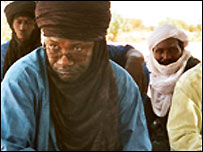Entered into the database on Friday, June 17th, 2005 @ 14:10:38 MST
A Niger court has freed on bail two anti-slavery campaigners who had been held
for six weeks on charges of fraud. The appeals court in the capital, Niamey, said
there were insufficient grounds to continuing holding the men. Ilguilas Weila and Alassane Biga deny trying to falsely elicit money from foreign
donors. The charges relate to a ceremony to free 7,000 slaves, cancelled at the last
minute in March by the government, which maintains slavery does not exist. London-based Anti-Slavery International has been urging the authorities to
release Mr Weila and Mr Biga, who both work for the anti-slave organisation,
Timidria. "The government's actions appear to be a concerted campaign not only to
discredit their reputation and the work of Timidria, but also to silence efforts
to end slavery in the country," said Anti-Slavery International Africa
Programme Officer Romana Cacchioli. Embarrassed At least 43,000 people are thought to live in subjugation across Niger, which
officially banned slavery in May 2003. The government says there is a caste system in Niger and members of lower castes
have been mistaken for slaves. The ceremony in March was due to be attended by representatives of the slaves,
the government and human rights campaigners at In Ates, near the border with
Mali. A local chief had agreed to the release of the slaves, but authorities now
say his letter to Timidria, of which Mr Weila is president, asking for financial
aid to rehabilitate slaves was a forgery. According to Timidria, males slaves are forced to work in farms and tender
cattle, while women are confined to domestic duties. The slave masters take the children from their mothers at two years old - to
break the family bond as soon as the child is weaned. And so slavery is perpetuated
from one generation to the next. Anti-Slavery International says President Mamadou Tandja is embarrassed by
any talk of slavery at a time when he is head of the West African regional organisation
- Ecowas. Acting under pressure, Niger's parliament made slavery punishable by up to
30 years in prison in 2003.
